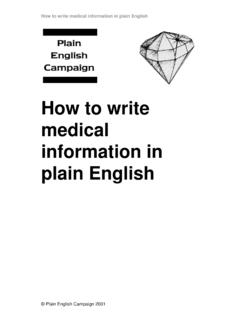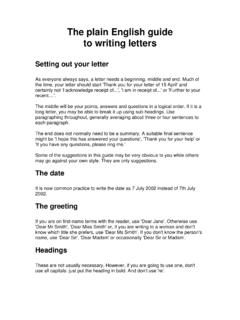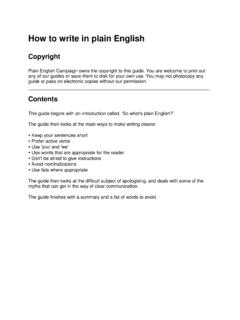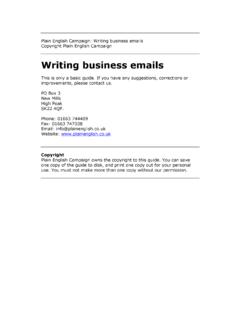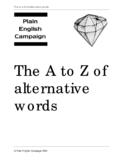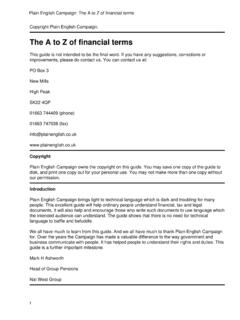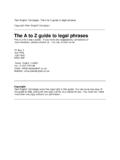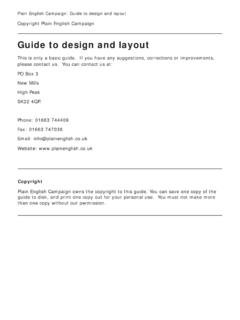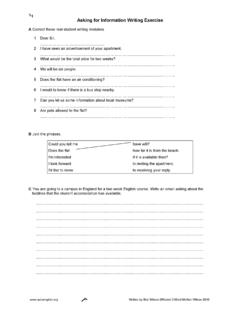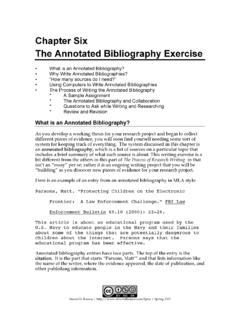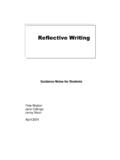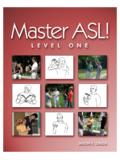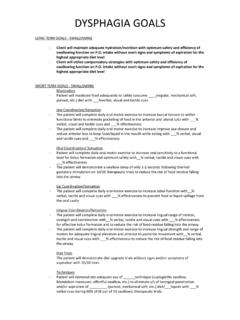Transcription of How to write plain English
1 how to write reports in plain English how to write reports in plain English plain English Campaign 2001 how to write reports in plain English Introduction Welcome to the plain English report-writing course. All you need is a pen, some paper, a little time and the will to learn. There is no great mystery about writing clear, concise and effective reports. The writing skills you will learn in this book will work in all types of business writing - letters, leaflets, memos and so on. What makes reports different is the formal way they are organised, and we ll be looking at that. All the examples are genuine. The answers to all the exercises are at the end of the guide. At the end of the course is a list of common bureaucratic words with plain English alternatives. Copyright plain English Campaign owns the copyright on this guide. You must not copy it without getting our permission first. You can download your own copy from our website ( ).
2 plain English Campaign 2001 how to write reports in plain English So what s plain English ? First let s say what plain English isn t and destroy some of the myths about it. It s not cat sat on the mat or Peter and Jane writing. Almost anything from leaflets and letters to legal documents - can be written in plain English without being patronising or over-simple. It doesn t mean reducing the length or changing the meaning of your message. Most of the UK s biggest insurance companies produce policies that explain everything fully in plain English . It s not about banning new words, killing off long words or promoting completely perfect grammar. Nor is it about letting grammar slip. It is not an amateur s method of communication. Most forward-looking senior managers always write in plain English . And finally, it is not as easy as we would like to think. Sadly, thanks to the bureaucrats of public service industries, local councils, banks, building societies, insurance companies and government departments, we have learned to accept anofficial style of writing that is inefficient and often unfriendly.
3 But in the last few years, many of these offenders have started to put things right, either rewriting their documents clearly or training their staff in the art of plain English or both. The advantages of plain English are: it is faster to write ; it is faster to read; and you get your message across more often, more easily and in a friendlier way. If you spend more than an hour a day writing, you are (to an extent) a professional writer. So it s vital that you get it right. plain English Campaign has led the way in the field of clear communication. The Campaign edits and designs documents for the country s largest organisations and runs hundreds of training courses every year. Now plain English Campaign has used all their experience to put together this teach-yourself course on writing reports in plain English . So what is plain English ? It is a message, written with the reader in mind and with the right tone of voice, that is clear and concise.
4 plain English Campaign 2001 how to write reports in plain English Keep your sentences short We re not going to join in the argument about what is a sentence? . Just think of it as a complete statement that can stand by itself. Most experts agree that clear writing should have an average sentence length of 15-20 words. This does not mean making every sentence the same length. Be punchy. Vary your writing by mixing short sentences (like the last one) with longer ones (like this one), following the basic principle of sticking to one main idea in a sentence, plus perhaps one other related point. You should soon be able to keep to the average sentence length - used by top journalists and authors - quite easily. At first you may still find yourself writing the odd long sentence, especially when trying to explain a complicated point. But most long sentences can be broken up in some way. Exercise Here are some examples. Split them where suitable by putting in full stops.
5 You may need to put in or take out words so that the new sentences will make sense. But don t change anything else. 1 From a formal report of a disciplinary interview I raised your difficulty about arriving ready for work on time and pointed out that your managers had done their best to take account of your travel problems and you had agreed with them that the Green Lane depot was the most convenient place for you to work, however, your initial improvement was short-lived and over the past two months your punctuality has dropped to a totally unacceptable level. 2 From an electricity company I do not seem to have received the information required from you to set up your budget scheme, and I now enclose the relevant form and ask that you fill it in and return it. 3 From a solicitor If you could let me have the latest typed version of the form in the next seven days, whereupon I suggest we meet here on 19 December to finalise the text so that you could then give me an estimate of the cost of producing a typeset proof.
6 4 From a credit company I refer to the earlier notice served in respect of your account as the arrears now amount to the sum shown above, you leave me with no alternative than to commence court action and details of your account have been referred to the company s solicitor. plain English Campaign 2001 how to write reports in plain English Actives and passives Do you want your reports to sound active or passive crisp and professional or stuffy and bureaucratic? Well, this is where we have to get grammatical. Most people know that a verb is a doing word, like make , do , play , talk or write . There are many ways to split verbs into different categories, but we re just going to consider the difference between active and passive verbs. Passive verbs make writing duller and harder to understand. Active verbs make writing livelier and more personal. But what are active and passive verbs? Let s take a simple sentence: The boss slammed the door.
7 Here, we can call the boss the doer . The verb is slammed . And the door is what we can call the thing . In almost all sentences that contain active verbs, the doer comes first, then the verb and then the thing. There will probably be lots of other words as well. For example: The boss, in a fit of temper, slammed the door to the outer office. But the order of doer, verb, thing stays the same. With passive verbs, the thing comes first: The door was slammed by the boss. You can see that by making the sentence passive, we have had to introduce the words was and by , which means the sentence is now much clumsier. Remember that the doer is not always a person and the thing is not always a thing! The tree crushed Peter is active but Peter was crushed by the tree is passive. And remember passive has nothing to do with the past tense. Here are some more examples of sentences containing passive verbs. Our active versions are underneath each one.
8 The matter will be considered by us shortly. (We will consider the matter shortly.) The riot was stopped by the police. (The police stopped the riot.) The mine had to be closed by the safety inspector. (The safety inspector had to close the mine.) plain English Campaign 2001 how to write reports in plain English Sometimes the doer gets left with passive verbs can make sense without having a doer. For instance, the door was slammed , the cheque had been cashed and the report is being written all leave out the doer. People used to officialese often write reports that are full of passive verbs, with sentences like these. 35 sites were visited in three weeks. Procedures were being properly followed at the sites visited. Overheads were not kept under control despite an awareness of the budgetary situation. Neither of these sentences has a doer. So the reader may be left asking, Who visited the sites? , Who was following procedures properly?
9 And so on. Changing to active verbs reveals the doers and sharpens up dull and unclear sentences. We visited 35 sites in three weeks. At the sites we visited, we found that staff were following procedures properly. Managers were not keeping overheads under control, despite knowing about the budgetary situation. You will notice that in the last sentence we have used an active verb instead of an awareness of . As we shall see later this is an example of changing a nominalisation into a verb. Spotting passivesThere is another way of spotting passive verbs which is especially useful when the doer isn t mentioned in the sentence. First, passive verbs almost always have one of the following words added on - be, being, am, are, is, was, were, will be. They are all formed from the verb to be . Second, they have a thing called a past participle . This table shows you how to get a past participle from a verb. Verb Past participle ask asked claim claimed do done write written plain English Campaign 2001 how to write reports in plain English So a complete passive verb could be will be done , has been formed or was watched.
10 Here are some examples: Care should be taken when opening the door. The outcome will be decided next week. Applicants will only be accepted if proof of purchase is enclosed. It can be done. The problem could not have been foreseen. Good uses of passives There are times of course when it makes sense to use a passive. To make something less hostile this bill has not been paid (passive) is softer than you have not paid this bill (active). To avoid taking the blame a mistake was made (passive) rather than we made a mistake (active). When you don t know who or what the doer is the England team has been picked . If it simply sounds better. But aim to make about 80-90% of your verbs active. Exercise The difference between active and passive verbs is not easy to grasp. So if you are confused, read this section again. If you are not, spot the passive verbs in the following examples and change the sentences around so that they use active verbs.
